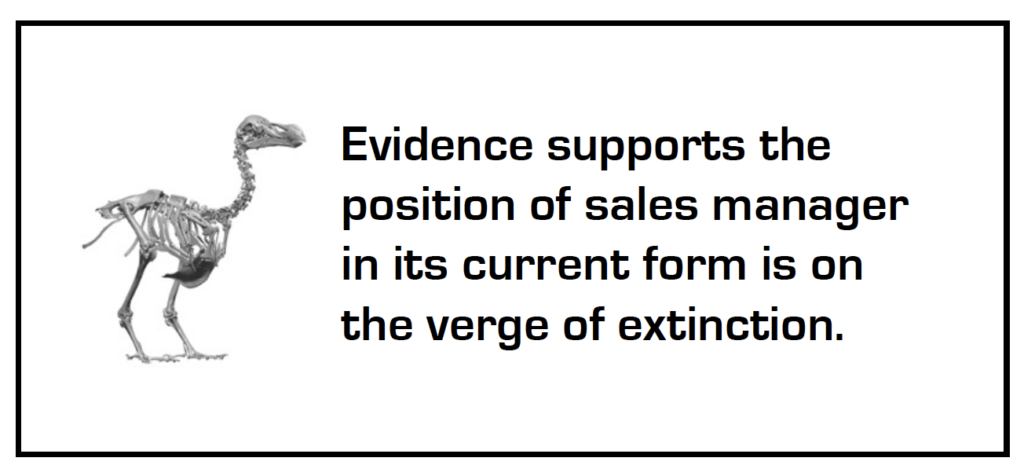DEATH OF THE SALES MANAGER

Ineffective Development
A recent study by CSO Insights found that around 60% of sales organizations globally consider their sales manager talent development efforts to be ineffective. Given this, it is no surprise that Salesforce.com reports only 28% of sales professionals expect to hit quota in 2023.

While pinpointing the top causes of not effectively developing talent can vary depending on the context and specific circumstances, two common factors emerge:
1) Lack of Training and Development: Many sales managers are promoted from within the sales team based on their individual sales performance, without necessarily receiving adequate training or support in leadership, coaching, and talent development. Without proper training and ongoing professional development, these managers struggle to effectively coach and develop their team members.
2) Focus on Short-Term Results over Long-Term Development: In numerous cases, organizations are prioritizing meeting short-term sales targets or quotas at the expense of investing time and effort into the long-term development of their team members. This results in a transactional management style focused on immediate results rather than fostering a culture of continuous learning and development.
Poor Prioritization
Unfortunately, even when organizations invest in their managers, they continue to short circuit the ability of the leader to develop their teams by monopolizing their time on non-people related activities. For instance, upwards of 76% of sales managers oversee their own accounts according to Hubspot in its August 2023 report. Even if this is not the case, managers report spending only 32% of their time managing people which includes skill development, deal compliance and other activities according to Leveleleven.com. Requiring sales managers to keep one foot in sales and the other in people development guarantees underperformance. The conflict over who is the most important customer makes it impossible for leaders to devote quality time to who are truly their most
important customers… the people on their teams.. If companies to continue to expect the impossible from these leadership roles, they will never consistently achieve their growth goals. Addressing these issues requires organizations to invest in comprehensive training programs for sales managers, emphasizing not only sales techniques, but also leadership, coaching, and talent development. Additionally, creating a supportive organizational culture that values and prioritizes employee development can help shift the focus towards long-term growth and success. What can your organization do to prevent the extinction of sales managers?
Corrective Action
There are only two ways to correct this situation: The most obvious is to redefine the role of the sale manager. What would happen if we made the sales manager 100% focused on people? This would require measuring and rewarding them based on their ability to develop the skills and behaviors required for sellers to be successful in their jobs. Delivering long-term sustainable growth requires the right skills, matched with the right customers and sales motions to differentiate in today’s world. This approach requires organizations to invest in comprehensive training programs for sales managers, emphasizing not only sales techniques but also leadership, coaching, and talent development. Additionally, creating a supportive organization that values and prioritizes employee development with a curiosity-based culture leads to improved engagement, communication, problem-solving, productivity and innovation. If companies are not willing to redefine the role of sales manager there is only one other alternative…eliminate the sales manager position and replace it with business managers with a much larger span of control. Use these individuals for business compliance-based activities with large teams. Then hire sales skill coaches to focus on people development. Regardless of what action companies decide to take, requiring the sales manager to be seller, coach, administrator, information provider, and a manager of customer relationships does not work. The numbers are clear, but the real question is, will companies actually enable sales leaders or will they just lead them to extinction?
The status quo is no longer an option. A better way is required.

